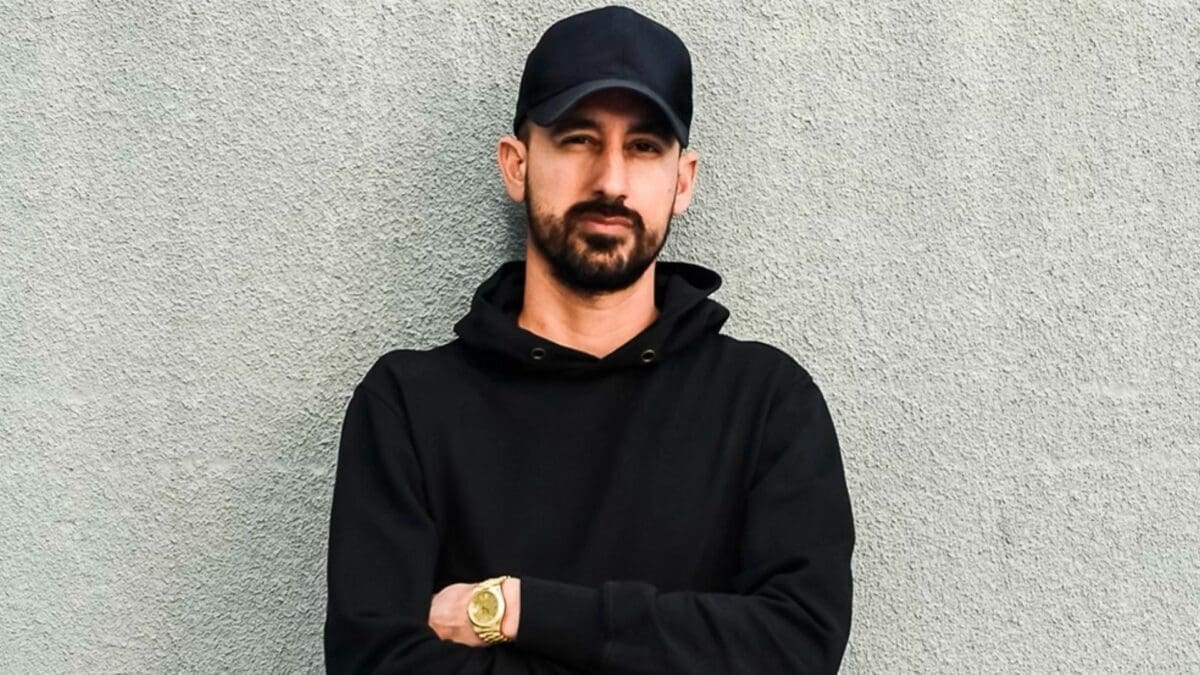In a candid conversation that’s as illuminating as a stage spotlight, we delve into the intricate world of music, where Daniel Scott, Head of Artist Development at Music Gateway, delves into the intricate world of music with Jay James, artist manager at The Fly United Talent & Artist Management company.
Jay James pulls back the curtain on his experiences, from the soaring harmonies of The Overtones to the raw talent showcased on America’s Got Talent, and the meteoric rise of Tom Ball. This isn’t just a chat about the glitz and glamour; it’s a deep dive into the grit, tenacity, and relentless passion that it takes to make it big in the music industry. So, grab your backstage pass and let’s get started on the story of Jay James.
*Edited for brevity.

D (Daniel Scott): Today I’m talking to Jay James, a successful artist and artist manager. We’re going to discuss everything from the music to the brand and everything in between. Can you give us a walkthrough of your career?
J (Jay James): I’ve been involved in the industry for around 17 years. Firstly as an artist and a songwriter, and for the last four years, I’ve been a member of The Overtones. We’re a multi-platinum-selling group with 5 top-ten albums and a No 1 selling album, and we’ve been blessed with 11 sellout national tours and continue to travel the world and do what we love to do.
I’ve worked with every aspect of the industry from record labels, publishing companies, reality TV, songwriting, and production. All that has set me up for management. For nearly a decade, I managed myself and I always had the instinct to know what I needed to do from a business aspect.
I was in the military for nearly 10 years as a physical training instructor, which was about bringing in that element of discipline and inspiration for people within the military.
So I’ve always loved working with people and working as a member of the team. For me to help mentor people in their music careers was always a bit of a goal. It was just where I found that transition. And I think certainly in the last three years, that has become more of a serious transition. And I say transition because I’m still an active artist with The Overtones and love to do that. So I founded and run a music management company and a creative agency called The Fly United or TFU.
The main goal here is to try and elevate as many incredible individuals who want to make it in the music industry and entertainment business. I’m having an absolute ball!
D: There’s so much there. And I know we’ve talked about this before but one question I always love to ask artists, and so I’m gonna ask you too, is what first got you into music?
J: Do you know what, I’d say music has played a part in my life for a long, long time. But as I mentioned, I was in the Navy for 10 years and it was there that I got into music seriously by accident. I was on an all-day session with a group of friends, and we were joking about New Year’s resolutions, and I saw a music shop across the road. I made a joke about going in and buying a guitar and becoming a rockstar. That’s what my New Year’s resolution was gonna be. I was fairly young at the time, and the lads were like, “Yeah, of course you will”. I was like, “I’ll go and do it now”.
And anyway, I walked across this road drunk and ended up buying a guitar, which I christened Lamar and took around all these different pubs with me for the rest of the night, and I was like, “Yeah, I’m off the job, I’ve got a gig tonight”. Then the next morning I woke up with this guitar in my bed and thought, “What on earth is this? What have I done?”
Three months later, I got injured playing rugby for the Navy and got sent on sick leave. At that moment in my career, I was doing pretty well for myself. I was really finding the rhythm in my job as a physical trainer. And it kind of felt like things got taken away from me. And in order to try and keep an element of focus, I turned to music and learned the guitar.
Full YouTube Interview With Jay James
As a byproduct of my bad guitar playing, I ended up singing the melody to carry my guitar playing and then discovered I could sing a little bit. From playing the guitar and learning the guitar, you start to listen to some of the greatest songs that have ever been written, which are 3-, 4-, and 5-chord sequences, that equally work really well for learning the guitar because you’ve only gotta learn 3 or 4 chords. And then, I just got addicted. I completely and utterly got addicted.
I think because of my background in the military, I was trained to suppress my emotions, but music is all about expressing emotions. So in a moment where I had a difficult time in my own life personally with being injured and not being able to go to work, not knowing if I was able to play sport at the level that I had done, and my best friend who I’d lived with having just been drafted out to Iraq. With all those things playing in my mind, I found this medium of music, which gave me the ability to really focus, lose myself and express myself.
And so, within the space of a year, I was writing music, and then when my best mate came back, he got me into doing bits of karaoke and then open mic nights and everything else. That’s when that side of stuff became a little bit more serious really. But, I’d certainly say that I found music in a sort of dark place and it really provided an element of light, and I just became addicted.
D: Yeah, I completely get it. That’s an experience so many people have, in terms of music being an escape or a way to express yourself, and then just becoming completely addicted to the art form.
J: Totally. And I think equally as the listener as well, right? I remember being on one of my last jobs in the military with the Commando Helicopter Force doing extreme cold weather survival training. And, you know, we were out there from minus 10 to minus 50 at times, quite isolated. And I just had music to listen to and things were going on at home and so, you know, I kind of lost myself in music.
At that moment, I was writing music, but equally learning from artists and groups. I absolutely loved it! And so music has become incredibly important in my life and given me a creative outlet, which I probably didn’t have previously, but I always had that creativity, I just didn’t know it. So it’s played an incredible role in my life.
D: I’d like to turn to your management company The Fly United. You briefly mentioned this earlier, but I’d love it if you could talk a little bit about who you are working with and some of the successes you’ve had recently.
J: As somebody that’s been involved in the music industry, I’ve been blessed to work with so many different people. I believe in taking the best from every single person that you meet. And I would say, the people that have made a real impact on my life and career, it’s probably been the likes of people like Booker T. & the M.G.’s, who are an absolute Stax legend. But also Justin Timberlake, the Jonas Brothers, Simon Cowell, and of course, producers and songwriters like Jimmy Jam, Terry Lewis, and The Underdogs. I could go on really. And they’ve all had an impact, you know? Having moments with those guys left a real mark.
I’d say I utilise all those different experiences within my management career now. And even with my career within The Overtones, it all kind of blends together.
But I think [my approach to] music management for me – I’ve kind of lived that and I am living that sort of life and career as an artist.
I kind of feel like I know, and I’ve always felt I knew what an artist needed, not just from a music business perspective, not just that guidance, but from a mental, physical, and spiritual level.
And so I suppose to answer your question, the biggest success story that I’ve had at the moment has probably been in the last year with a guy called Tom Ball. Many will know Tom from Britain’s Got Talent [BGT], he was the runner-up in 2022. And I started to work with Tom shortly after. Again, I spoke to him very quickly about coming up with a strategy, coming up with goals, what his goals were, what he wanted to achieve, and what he wanted to do. Then really carving out a concept and a strategy to try and make that happen, to help facilitate that.
We’ve had some amazing experiences and he’s done so well. From going from BGT to America’s Got Talent All-Stars [AGT], which was branded the best of the best, where they took the best acts and winners from Got Talent shows from all over the world and put them into one huge competition in Hollywood. Tom came away with a golden buzzer, the first-ever golden buzzer in the history of AGT All-Stars. It went viral, and then he went straight to the finals and had some great moments. But from those moments we utilised them and strategised to make sure that we could launch his music career in the right way.
Working alongside Music Gateway in releasing music independently was crucial to setting up his long-term strategy. And we’ve just signed him to a major independent with Westway Music, and he’s creating an album, just dropped a single, and even went back on Britain’s Got Talent this year as a special guest. And when we look back and analyse the last year, we’ve succeeded in every single goal that we set ourselves. That’s a success.
I talk about this a lot within the music business when I start to work with an artist or provide advice: I talk about setting yourself up to make music a long-term thing – you have to make music a business. That’s something that a lot of people don’t think about. They think, “Oh, I’ve just gotta write the song and do a gig and I wanna do this”.
But to make a business out of this, you’ve really gotta prove yourself and make yourself an asset. You’ve gotta provide value for other people who are investing in you, whether that be business partners or the listener. So it’s crucial to have that type of mindset.
Working with Tom has been a wonderful experience. He’s someone I adore managing. We’ve got a great relationship as manager, mentor, and friend. That’s essential in the industry. Naturally, within The Overtones, I take on an operations manager and business manager role, which is great. I work with Abby Edwards, who just won [IVT’s] Starstruck this year, and James Graham, an amazing talent who had huge success in the UK and America. I also work with some developing artists. Life’s good.
D: Congratulations on the signing! It’s amazing, and it’s a testament to your hard work and Tom’s hard work. We love Tom’s music at Music Gateway and we’re always listening to it in the office. So, it’s great to hear you talk about it.
Now, onto my next question, and it’s another one that artists often ask me. Which is more important, the music or the branding? And I don’t just mean if the music has to be good, but which should be the primary focus? I’m sure you’ll have a strong opinion about this.
J: Yeah, I do. Firstly, I would say the answer is music front and centre. You cannot build an empire without music in the music business. You really have to work on the product and come up with the concept of who you are and what you’re about. You’ve got to get the music right and get who you are right. You can’t just start creating a brand and then make music out of it unless you’re a songwriter.
In this particular instance, if you’re talking about artists and groups in music and artist development, it all starts with music. Then you can work on branding, which is hugely important. Branding is hugely important, but it’s nothing without a great song and a great product.
I completely agree. I get asked that a lot, and I understand why. People focus on numbers and appearances, but they often overlook the fact that music is the product. It’s so important to keep sight of that.
It is. In my early days as a singer-songwriter, I played every gig I could, even if there were only a handful of people in the audience. I believe in that. You can have the person in the front row reading the newspaper and not really caring, but they wouldn’t be there if it wasn’t for the music. It all starts with the music, but branding and perception are also important in an artist’s career. You have to think about that. But yeah, you have to get the song right first.

D: So, talking about an artist’s career, can you tell us more about your solo endeavours?
J: Yeah, I started in Portsmouth playing open mic nights and gigs. Then I started doing shows in different places to build support and connect with fans. I released a demo and did lots of shows, which led to some success on an online independent music store. It wasn’t huge, but it got people talking about me based on the success of something they’d never even listened to. That formed a catalyst for people to gain interest. Then, being in the military and the Navy also added to the interest.
I realised early on that giving people a reason to come and listen to my music was important. I believe in giving people a reason to come and see and listen to your music.
J: When I started working with major labels, I talked about value and the songs I had. I wanted to be a great investment. But I didn’t feel like a priority at times, so I found a fantastic independent manager and eventually signed a record deal with Decca Records at Universal and learned valuable lessons about managing myself and creating momentum in the industry. You have to cover every aspect and do things the right way while having fun.
D: What are you looking for as a manager that makes you want to work with an artist?
J: I look for the music, the voice, and the attitude. If someone has an incredible voice but lacks the right attitude, it’s a big no for me. You have to be prepared to work hard, even harder than your manager. Attitude and being a kind person are everything in the industry. Treat people right, and they will be inspired to help you.
D: And what would you say to an artist looking to work with management?
J: Attitude is everything. Managing expectations and understanding that you are responsible for your own career and business is crucial. You need to be open to guidance, critique, and inspiration. As an artist, you have to work hard, not just expect others to do everything for you. It’s your career, and you have to lead the way.
The music industry is difficult but amazing. Singing and putting your music out there is a blessing. Working with the right team and being good to people is essential. I’m excited to help others and work alongside Music Gateway.
D: Before we wrap up, what’s the best piece of advice you’ve ever been given by someone in the industry?
J: There’s so much great advice, but one important one is to never be fooled into thinking you know best. As artists, we can get carried away with our creative vision and ego. It’s important to invest in people, listen to advice, and have a team that can help guide you. Another piece of advice is that you live and die by your sword. You have to make decisions and take responsibility for your career. It’s your ship, and you have to lead the way.
Closing Thoughts on Jay James & The Fly United
As we wrap up our illuminating discussion, it’s clear that Jay James, Artist Manager of The Fly United and former singer with The Overtones, is a wellspring of wisdom and experience. His insights into the music industry, artist development, and the unique journeys of his bands are invaluable. We appreciate Jay’s openness and the time he took to share his perspectives with us.
From Jay James the naval officer, to Jay James, singer with The Overtones, to Jay James, head artist manager at The Fly United. His is a story of unrivalled determination and drive to navigate and conquer his goals.
Thank you, Jay James, for your time and your unwavering dedication to music and artist growth. We look forward to seeing what you and your bands will bring to the stage next. And thank you, Daniel Scott, for hosting this insightful conversation. The world of music is indeed an ever-evolving landscape, and it’s voices like Jay’s that help us navigate it with a more profound understanding.
Daniel Scott is Head of Artist Development at Music Gateway
Jay James is Head Artist Manager at The Fly United









